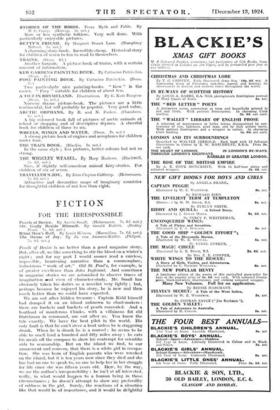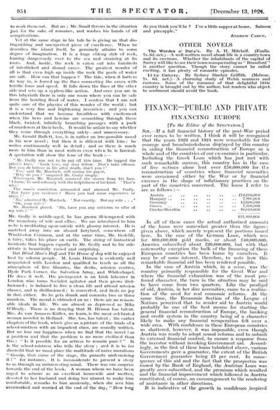FICTION
FOR THE IRRESPONSIBLE
Blind Man's Buff. By Louis Hemon. (Macmillan. 7s. 6d. net.) The House of Joy. By Jo van Ammers.Kiiller. (Philpot. 7s. tid. net.) Pearls of Desire is no better than a good magazine story. But, after all, we like something to stir the blood on a winter's night ; and for my part I would sooner read a careless, impossible, heartening narrative than a commonplace, industrious " work of art." Old St. Paul's, for example, is of greater excellence than John Inglesant. And sometimes in magazine stories we are astonished to observe traces of imagination wad even of character-study. Mr. Small has obviously taken his duties as a novelist very lightly ; but, perhaps because he enjoyed his story, he is now and then much better than we could have expected.
We are out after hidden treasure : Captain" Kidd himself had dumped it on an island unknown to chart-makers : there are buckets and buckets of pearls concealed. And a boatload of murderous Chinks, with a villainous fat old Dutchman in command, are out after us. You know the tale exactly. We have the best pilot in the world. His only fault is that he can't steer a boat unless he is staggering drunk. When he is drunk he is a marvel : he seems to be able to smell land a hundred and fifty miles away : he eats his meals off the compass to show his contempt for scientific aids to seamanship. But on the island we find, to our amazement and concern, that there is a white girl in occupa- tion. She was born of English parents who were wrecked on the island, but it is ten years now since they died and she has had no one to speak to, no one to help her in her struggle for life since she., was fifteen years old. . 'Jere, by the way, we see the author's irresponsibility : he isn't at all interested, really, in what would happen to a human being in these circumstances ; he doesn't attempt to show any profundity - of oddness in the girl. Surely, the reactions of a situatgm like that would be of importance, and it would be delightful to work them out. But no ; Mr. Small throws in the situation just for the sake of romance, and washes his hands of all complications.
Yet at the same stage in his tale he is giving us that dis- tinguishing and unexpected, piece of excellence. When he describes the island itself, he genuinely attains to some degree of imagination. It is a huge oblong slab of reek, leaning dangerously over to the sea and straining at its roots. And, inside, the rock is eaten out into hundreds of interlinked and dismal caves. The greatest wonder of all is that even high up inside the rock the pools of water are salt. How can that happen ? The tide, when it batters its way in, is forced up the flues connecting the caves with terrific force and speed. It falls down the flues at the other side and sets up a syphon-like action. And once you are in this labyrinth there is only one room where you can be safe from the howling flood of water. I confess that I am not quite sure of the physics of this wonder of the world ; but it is a very fine and frightening invention ; and you can understand that we become breathless with excitement when the hero and heroine are scrambling through those black, twisted, infinitely branching passages with a pack of murderers at their heels. It would be unfair to say whether they come through everything safely—and unnecessary.
Mr. Gerald Bullett, too, is in rather an irresponsible mood in his new novel ; but then it is different with him ; he writes continuously well in detail ; and so there is much more in him than in most writers even when he is farcical. A quotation will show the tone of the book :-
" Mr. Godly was not to be put off this time. He tapped the other's knee. ' Look here, my dear fellow. Don't take offence. But you do believe in life after death, don't you ? '
Yes,' said Mr. Murdoch, still eyeing his papor. Why do you ? ' enquired Mr. Godly simply. Whereupon Mr. Murdoch removed the screen from his face.
' I know,' ho said solemnly with the helpfulness of his kind. That's why.'
The man's conviction astounded and alarmed Mr. Godly. But have you evidence ? Have you had some experience or other ' ' No,' admitted Mr. Murdoch. ' Not exactly. But my wife . . . Oh, your wife ! '
Mr. Murdoch glared. Sir, have you any criticism to offer of my wife ? ' "
Mr. Godly is middle-aged, he has grown ill-tempered with the monotony of wife and office. We are introduced to him as he is meditating upon suicide with gloomy interest. He is snatched away into an absurd fairyland, somewhere off WimblAon Common, and at the same time, Mr. Godelik, a fairy, takes his place on earth. The string of fantastical incidents that happen equally to Mr. Godly and to his sub- stitute is beautifully varied and surprising.
But Blind Man's Buff and The House of Joy will be enjoyed best by solemn people. M. Louis Hemon is evidently well acquainted with London and qualified to teach us all the atmosphere of free libraries, the docks, mission centres, Hyde Park Corner, the Salvation Army, and Whitechapel.
He does it well. His protagonist is an Irish labourer in London who turns Socialist agitator and then grows disil- lusioned ; is induced to live a clean life and attend mission classes, and is disillusioned ; is converted, and finds no joy in that, either. So he gets drunk and commits two or three murders. The moral is obtruded on us : there are no reason- able ideals in life. We are almost as depressed as Mike O'Brady. There is no denying that M. Hernon has talent. Mrs. Jo van Ammers-Kiiller, we learn, is the most celebrated woman novelist in Holland. She, too, has talent ; the earlier chapters of the book, which give us a picture of the trials of a school-mistress with an impudent class, are soundly written. But we lose our happiness when we find that the novel I.as a problem and that the problem is no more civilized than this : " Is it possible for an actress to remain pure ? " It is the school-mistress who tells the story ; and it is to her discredit that we must place the multitude of naive moralisms " Gossip, that curse of the stage, the parasite undermining it ! " for instance. It is inconsiderate to present a story to us through an uninteresting mind. There was one surprise towards the end of the book. A woman whom we have been urged to admire as an excellent housewife and mother, devoted to her husband and doing her utmost to make him comfortable, remarks to him anxiously, when she sees him overworked and worried at the end of the day, " How long
do you think you'll be ? I've a little supper at home. Salmon' - and pineapple."
ANDREW CAREY.



























































 Previous page
Previous page